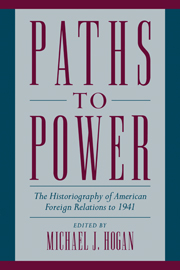Book contents
- Frontmatter
- Dedication
- Contents
- The Authors
- Preface & Acknowledgments
- 1 Introduction
- 2 New Directions in the Study of Early American Foreign Relations
- 3 The Great American Desert Revisited: Recent Literature and Prospects for the Study of American Foreign Relations, 1815-1861
- 4 Coming to Terms with Empire: The Historiography of Late Nineteenth-Century American Foreign Relations
- 5 Symbiosis versus Hegemony: New Directions in the Foreign Relations Historiography of Theodore Roosevelt and William Howard Taft
- 6 The Reclamation of Woodrow Wilson?
- 7 Reaching for the Brass Ring: The Recent Historiography of Interwar American Foreign Relations
- 8 The United States and the European War, 1939-1941: A Historiographical Review
- 9 The Origins of the Second World War in Asia and the Pacific: Synthesis Impossible?
- Index
5 - Symbiosis versus Hegemony: New Directions in the Foreign Relations Historiography of Theodore Roosevelt and William Howard Taft
Published online by Cambridge University Press: 12 October 2018
- Frontmatter
- Dedication
- Contents
- The Authors
- Preface & Acknowledgments
- 1 Introduction
- 2 New Directions in the Study of Early American Foreign Relations
- 3 The Great American Desert Revisited: Recent Literature and Prospects for the Study of American Foreign Relations, 1815-1861
- 4 Coming to Terms with Empire: The Historiography of Late Nineteenth-Century American Foreign Relations
- 5 Symbiosis versus Hegemony: New Directions in the Foreign Relations Historiography of Theodore Roosevelt and William Howard Taft
- 6 The Reclamation of Woodrow Wilson?
- 7 Reaching for the Brass Ring: The Recent Historiography of Interwar American Foreign Relations
- 8 The United States and the European War, 1939-1941: A Historiographical Review
- 9 The Origins of the Second World War in Asia and the Pacific: Synthesis Impossible?
- Index
Summary
Although this may not be a golden era in the historiography of Theodore Roosevelt and William Howard Taft, the field is active, the pot is simmering, and the possibility exists that a new paradigm might emerge. John Lewis Gaddis has recently judged William Appleman Williams's economics-oriented “Open Door“ thesis to be the ”dominant interpretive paradigm in American diplomatic history.” And while Gaddis might be correct in assessing the entire field of diplomatic history, a somewhat similar paradigm - what I will call the hegemony paradigm - has emerged as the consensus model in the literature on Roosevelt and Taft. The hegemony paradigm originated in the traditional emphasis on Roosevelt's “big stick” diplomacy. William Harbaugh modified it by integrating the idea of responsibility with Roosevelt's exercise of power. And David Healy used it in his recently published synthesis of Roosevelt's diplomacy.
The hegemony paradigm has identifiable weaknesses and deserves to be replaced by another concept, which I call “symbiosis,” that is far more useful. Many scholars who use the hegemony paradigm recognize the importance of cultural relations between peoples, but they generally emphasize struggles among the great nations or between imperial powers and weaker ones. The symbiosis paradigm, by contrast, emphasizes cultural interaction and thus eliminates one of the shortcomings in the hegemony approach; in addition, it is well-suited to diplomatic historians who are sensitive to international approaches, allowing them to consider the international context of crisis and the great global changes that confronted both Roosevelt and Taft. Recent works by Michael Hunt and Warren Cohen on U.S.-Asian relations and my own studies of the Caribbean follow the symbiosis paradigm, which other scholars should also consider as a model for understanding Roosevelt's diplomacy.
David Healy's Drive to Hegemony: The United States in the Caribbean, 1898-1917 (1988), marks the high point of the hegemonic framework. Healy's book spans the years from the Spanish- American War to U.S. entry into World War I with such balance and nuance that reviewers as disparate as David Pletcher, Louis A. Perez, and Robert Freeman Smith lavishly praised the work. In every phase of U.S.-Caribbean relations Healy summarizes, synthesizes, and balances the extremes. He treats the United Fruit Company with rare nuance, for example, and deftly assesses dependency theory while also noting its flaws.
- Type
- Chapter
- Information
- Paths to PowerThe Historiography of American Foreign Relations to 1941, pp. 117 - 147Publisher: Cambridge University PressPrint publication year: 2000



